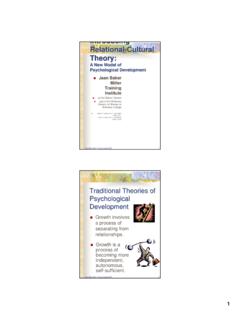Transcription of Agenda Introduction to Strategic Framing: A …
1 1 Agenda Introduction to Strategic Framing: A Master-class and Workshop with the FrameWorks Institute Wednesday 7th October 2015 Venue: The Foundry, 17 Oval Way, London, SE11 5RR Framing is an approach to communications rooted in social and cognitive sciences. Research shows that changing the ways that issues are framed can shift attitudes, improve understanding and increase support for solutions. We are delighted to have Dr Nathanial Kendall Taylor with us to lead this master-class. Participants will explore how framing can expand their base of support, build public will and deepen public understanding of specific social issues. Participants will also have the opportunity to share their experiences, explore challenges to using the method and consider examples where framing has been used to improve social outcomes. Who is this workshop for? Any funder or member of the voluntary sector who want to gain a more sophisticated understanding of how to communicate better and why their current strategies for getting their message across might be doing more harm than good: communications officers, executive directors responsible for strategy and overall direction, campaigners and project officers seeking social change, grant-makers and funders who want to understand how changing opinion is driven.
2 By the end of the day, participants will: Understand much more about the evidence based research which spell out the pitfalls Appreciate the concepts behind successful communications Learn how to develop a tailored story Practice how to start reframing a message This event is open to grant-makers and members of the voluntary sector. All Ariadne events operate under a rule that no participant may ask another for funds or seek contact details for fund-raising purposes. 2 Outline of the Day - : Registration and Coffee - : Welcome and Introductions Master-class with Dr Nathaniel Kendall-Taylor Dr Nat Kendall-Taylor is Senior Vice President at the FrameWorks Institute in Washington DC. In this role he applies cognitive theory to understand how people interpret information and how frames can be used to create new ways of understanding social issues. : Part 1: What is Framing and Why do We Need it?
3 : Coffee and pastries : Part 2: How is Framing Research Done? Case Studies Both sessions will consider how framing research can be used to advance social change and human rights. : Open discussion : Networking lunch Practical Applications : Introduction In the afternoon, four voluntary sector practitioners will briefly tell a story about the way in which they have tried to implement the concepts in their own organisations and their gains and losses so far. This will give participants a way to choose which group they would like to join. : Unwrapping the theory: How do I do this for my organisation? These four separate sessions are aimed at helping to un-wrap the theory and look at the practical steps needed to make this work for participants. How can they start? How can they convince others? What are the potential gains and the possible problems, how can they be overcome?
4 Each session will look at different field and organisation and hear how the theory has been implemented. Everyone will have then have to chance to think in a group about how they would use these ideas to change the way in which they work in their own organisations. Sessions: 1. Child Poverty and Child Protection: This session will consider the specific challenges faced by organisations working to change public policy in the children s sector. The discussion will cover work being done around child poverty and protection issues and will involve two organisations that are well into their reframing journey. The session will be moderated by Esther Hughes, Executive Director at Global Dialogue with expert input from Kate Stanley, Head of Strategy at the National Society for the Prevention of Cruelty to Children (NSPCC) and Enver Solomon, Director of Evidence and Impact at the National Children's Bureau.
5 3 2. Criminal Justice: we will discuss work recently begun which aims to challenge negative views of the public and politicians towards people in the criminal justice system by reframing the messages on crime and justice. The session will be moderated by Jenny Oppenheimer, Ariadne UK Coordinator, and will have expert input from Penelope Gibbs, Director of Transform Justice. 3. Human Rights we will draw on a funder s perspective of supporting human rights organisations to understand and communicate messages more effectively. The session will be moderated by Sarah Pugh, Coordinator, Thomas Paine Initiative and will have input from Neil Crowther, Director at Thomas Paine Initiative. 4. Open Session: This will take a broader view of the field with the help of Elena Blackmore, Researcher at Public Interest Research Centre, who has extensive experience of using this methodology in a variety of settings, including LGBT Rights and other work.
6 We will consider the role of values in society and the part that voluntary sector plays in shaping these values and look specifically at the needs of each participant in suing these ideas in their own organisations. The session will be moderated by Jo Andrews, Ariadne Director. : Wrap up and report back
